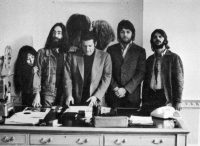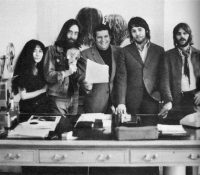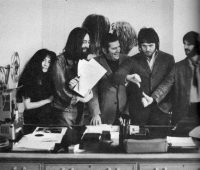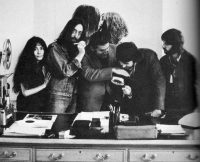Although the previous week John Lennon had decided to leave The Beatles, Allen Klein persuaded him to keep quiet in public. Nonetheless, on 20 September 1969 Lennon chose to tell the rest of the group.
Klein was in the process of renegotiating a new contract for the group with EMI/Capitol, and persuaded Lennon that it was in everyone’s interests to deny that the dream was over, at least for a while longer. The new contract was signed by The Beatles on this day, just before Lennon revealed his plans to leave.
The Beatles’ new contract
Since May 1969, Klein had been arguing for an improved royalty rate. The Beatles’ financial situation was precarious, he said, and it was in EMI’s interests to provide a better deal for them. The group had almost fulfilled the minimum terms of their existing contract from January 1967, having delivered numerous hit singles, the double Magical Mystery Tour EP, the double album The Beatles (White Album), the Yellow Submarine soundtrack, and the best-selling Sgt Pepper’s Lonely Hearts Club Band.
The November 1968 release of the White Album had pushed EMI’s share of the UK record market up from 28% to around 40%, and had accounted for more than £900,000 in retail sales. Furthermore, The Beatles were shortly to release Abbey Road, which put Klein in a strong bargaining position.
The Beatles’ existing deal with EMI and Capitol gave them 17.5% of the US wholesale price – a considerable amount already. Klein was able to increase to 25%. He was able to argue that, should the label object, The Beatles would cease to record for them.
In return for the higher rate, The Beatles would deliver two new albums each year, whether as a group or individually, until 1976. Under the terms of the deal, new albums would earn 58 cents until 1972, and 72 cents thereafter.
Klein also gained Apple Corps the right to manufacture and sell The Beatles records in the US. EMI would retain the recordings, but Capitol would manufacture the releases on Apple’s behalf. Apple would then profit from the difference between manufacturing and retail costs.
The new terms gave The Beatles the right, for the first time, to determine the ways in which their music was manufactured and sold. By 1971 the group’s entire back catalogue was made available on Apple Records. The Beatles’ personal incomes were greatly improved, and Apple was guaranteed a regular income until at least 1976.
The Beatles’ meeting
The contract was signed on this day; despite his reservations over Klein, Paul McCartney added his signature along with Lennon and Ringo Starr. George Harrison was visiting his mother in Cheshire at the time, but signed the contract a few days later.
The meeting took place at Apple’s headquarters in London’s Savile Row. John Lennon used the opportunity to tell McCartney and Starr that he was leaving the group.
When I got back [from Toronto] there were a few meetings and Allen said, ‘Cool it,’ ’cause there was a lot to do [with The Beatles] business-wise, and it wouldn’t have been suitable at the time. Then we were discussing something in the office with Paul and Paul was saying to do something, and I kept saying, ‘No, no, no’ to everything he said. So it came to a point that I had to say something. So I said, ‘The group’s over, I’m leaving.’ Allen was there, and he was saying, ‘Don’t tell.’ He didn’t want me to tell Paul even. But I couldn’t help it, I couldn’t stop it, it came out. And Paul and Allen said they were glad that I wasn’t going to announce it, like I was going to make an event out of it. I don’t know whether Paul said, ‘Don’t tell anybody,’ but he was damn pleased that I wasn’t. He said, ‘Oh well, that means nothing really happened if you’re not going to say anything.’ So that’s what happened.
Lennon Remembers, Jann S Wenner
In the Anthology book Paul McCartney revealed his reaction to Lennon’s decision.
I’d said: ‘I think we should go back to little gigs – I really think we’re a great little band. We should find our basic roots, and then who knows what will happen? We may want to fold after that, or we may really think we’ve still got it.’ John looked at me in the eye and said: ‘Well, I think you’re daft. I wasn’t going to tell you till we signed the Capitol deal’ – Klein was trying to get us to sign a new deal with the record company – ‘but I’m leaving the group!’ We paled visibly and our jaws slackened a bit.I must admit we’d known it was coming at some point because of his intense involvement with Yoko. John needed to give space to his and Yoko’s thing. Someone like John would want to end The Beatles period and start the Yoko period; and he wouldn’t like either to interfere with the other. But what wasn’t too clever was this idea of: ‘I wasn’t going to tell you till after we signed the new contract.’ Good old John – he had to blurt it out. And that was it. There’s not a lot you can say to, ‘I’m leaving the group,’ from a key member.
I didn’t really know what to say. We had to react to him doing it; he had control of the situation. I remember him saying, ‘It’s weird this, telling you I’m leaving the group, but in a way it’s very exciting.’ It was like when he told Cynthia he was getting a divorce. He was quite buoyed up by it, so we couldn’t really do anything: ‘You mean leaving’? So that’s the group, then…’ It was later, as the fact set in, that it got really upsetting.
Anthology
During the meeting Lennon and Yoko Ono also made Klein business manager of their company Bag Productions.
After the Plastic Ono Band’s debut in Toronto, we had a meeting in Savile Row where John finally brought it to its head. He said: ‘Well, that’s it, lads. Let’s end it.’ And we all said ‘yes’. And though I said ‘yes’ because it was ending (and you can’t keep it together anyway, if this is what the attitude is) I don’t know if I would have said, ‘End it.’ I probably would have lingered another couple of years.But when we all met in the office, we knew it was good. It wasn’t sulky and we weren’t really fighting. It was like a thought came into the room, and everyone said what they said. John didn’t think we should leave, just that we should break it up. It was not: ‘I’m leaving, you’re leaving.’ It was: ‘Well, that’s it! I’ve had enough. I want to do this…’
If that had happened in 1965, or 1967 even, it would have been a mighty shock. Now it was just ‘let’s get the divorce over with’, really. And John was always the most forward when it came to nailing anything.
Anthology
Also on this day...
- 2024: Ringo Starr and his All-Starr Band live: Mohegan Sun Arena, Uncasville
- 2023: Ringo Starr and his All-Starr Band live: Rio Rancho Events Center, Rio Rancho
- 2022: Ringo Starr and his All-Starr Band live: Virginia Credit Union LIVE!, Richmond
- 2018: Paul McCartney live: Bell Centre, Montreal
- 2015: The Beatles’ first contract sells for $75,000
- 2005: Paul McCartney live: Philips Arena, Atlanta
- 1977: UK album release: Ringo The 4th by Ringo Starr
- 1975: Wings live: Usher Hall, Edinburgh
- 1968: Recording: Piggies, Glass Onion
- 1967: Filming: Magical Mystery Tour
- 1966: BBC interview with George Harrison
- 1964: The Beatles live: Paramount Theatre, New York City
- 1962: The Beatles live: Cavern Club, Liverpool (lunchtime)
- 1961: The Beatles live: Cavern Club, Liverpool (evening)
- 1960: The Beatles live: Indra Club, Hamburg
Want more? Visit the Beatles history section.







It’s difficult to imagine The Beatles as a working entity ending any other way than they did because that was how we all know it happened. It’s really too bad however that as many famous rock bands did later on, they didn’t just decide they needed a break of say one to three years giving them each a chance to persue solo interests, get rejuvenated a bit, and then return to record fresh new material together. It wouldn’t surprise me also if they thought something along the lines of, “bloody hell, we’re never going to top what we’ve already done so let’s leave well enough alone!”.
This wasn’t the stones. The Beatles had too much talent and they would have all wanted there own careers except for Ringo who was contented and still is .
The fame playing session me. On each others records they just couldn’t stomach it anymore
The others should have agreed to break up at this point rather than letting the group slowly peter out over the next 7 or 8 months.
Yet, when Paul announced his departure from the band six months later, the other three denied there having been a split until John’s Rolling Stone interview more than six months after that, in December 1970, the month of Paul’s lawsuit.
After John’s private announcement, Paul basically played the waiting game for a couple of months, knowing John was no stranger to changing his mind, but around the time Paul, George and Ringo went into Abbey Road to record I Me Mine(January 70), it must have dawned on Paul that John definitely wasn’t going to, and started recording the McCartney album. (Started in December 69, but only home recordings. Studio recordings started 12th of February 70.)
Paul wanted the band to go on, but ended up being the one telling the world it wouldn’t, whereas George and Ringo *may* not have cared if the band went on or not, but like John, they were heavily chaperoned by Klein to keep their mouths shut.
A few weeks after Paul’s statement, Ringo told a reporter, “I just feel it in my bones that we’ll probably all be recording together again before very long.” George said, “There is every prospect” that the Beatles eventually would work together again. “Everyone this year is trying to do his individual album, but after that, I am ready to go back to work together again.” In early summer, George, while working on “All Things Must Pass”, again said he’d expect the Beatles to be working together, possibly by the end of the year.
John initially had little response to Paul’s announcement, saying only, “Paul phoned me to say ‘I’ve decided to leave The Beatles.’ It was good to hear from him, now that I know he’s not dead [a reference to the “Paul is dead” hoax that broke the previous fall].”
In the May 14 edition of _Rolling Stone_, John made his feelings clearer: “It’s the simple fact that [Paul] can’t have his own way, so he causing chaos. I put out four albums last year, and I didn’t say a f*****g word about quitting.”
They did break it up, meaning they didn’t perform or record together again. The business end of it didn’t end until McCartney dissolved the partnership. Technically McCartney ended the band permanently.
Yoko helps for this.
You obviously don’t know a whole lot about it.
By not announcing publically that he was leaving the group, john was keeping his options open. There were several times in the following seven months that he did Beatle related activities and continued to identify himself as a Beatle.
In due time, he may have been inclined to record with the group again, but Paul’s announcement on april 10, 1970 made that a moot point. While it would have been amazing if they had somehow continued and made a few more albums, this break up preserves their “mythical status” in history. They were here….they were amazing…and then they were gone never to return. In 200 years, people will still be listening to The Beatles in the same vein that we listen to Mozart and Beethoven today!
Thank god they didn’t drag it out like the stones. They forever left their fans wondering “what if”. But once Lennon was murdered, the dream was truly over.
Burlingame,CA. USA
In Patti Boyd’s book, she mentions that John visited George and her her at their house, presumably shortly after the Apple meeting. She said George was upset by John’s decision to leave the band. She doesn’t indicate whether he was upset because it could effect business matters, or if George perhaps felt the band had more gas in the tank. Which would be odd, since George in that period seemed to be indifferent (at best) about the band’s musical future.
This is one of many examples in that awful book where Patti declines to fill in the gaps, declines to even speculate. She comes across in the book as one of the most incurious, intellectually lazy human beings who has ever written a book.
George wanted the Beatles to continue even after he put out All Things Must Pass.
At that time George was motivated by several different considerations, among these were: 1) he was definitely opposed to any live appearances by the Beatles because that would be nothing but a spectacle and wouldn’t do justice to their studio-produced music; 2) by that time he had a such a backlog of compositions that it would probably take 10 years to get them all on Beatles albums; and yet 3) I really believe he wanted to continue to record with the other Beatles in some way. As evidence for the last point, consider all of Ringo’s songs George helped with at the start of Ringo’s solo career as well as George’s appearing on John Lennon’s Imagine album.
It’s also interesting that when John went off to do the Plastic Ono Band concert in Toronto he asked George to go along as guitarist, and only turned to Eric Clapton when George declined.
and Paul’s comment that the band couldn’t survive John’s departure because John was a “key member” ? Whoopsy! Kind of an indirect slap in the face to George & Ringo ?
No… Paul’s comment (that the band couldn’t survive John’s departure) was simply the truth.
As John said in the 1980 Newsweek interview, “Paul and I created the music, OK?” He indicated in the same interview that, if he and Paul decided to make music again, whether George and Ringo joined in would be irrelevant.
Not a slap in the face but 100% true. Who would they have enlisted to take John’s place: Peter Noonan? (i don’t even know if Pete plays the guitar).
Paul never signed the agreement with Klein. Not only was he the most musical but seemingly the most business savvy.
Ah, the break-up of the Beatles – so understandable from the perspective of four young men who naturally sought to escape their gilded cage and get on with their lives… and yet so wistful for those of us who naturally wanted more. I sometimes daydream about the sensational, hit-studded 1970 Beatles album that never was, comprised of such gems as What Is Life, Maybe I’m Amazed, Instant Karma, It Don’t Come Easy, Junk, Look at Me, Beware of Darkness, Every Night, Love, and (well, ok) My Sweet Lord… Not to mention whatever further inspirations might have burst forth from the well-spring of their collaboration…
Sure, Paul was stating the truth. But you miss the point. He was the most PR-aware of the 4. Slagging off George and Ringo in that way was more John-like than Paul-like.
Those guys made great music individually in 1970, and it’s tempting to imagine how the 4 of them could’ve recorded those 1970 songs as a band. But I don’t believe it would’ve worked. Too much baggage by that point.
The great solo albums of 1970 seem so different from what they did together in those final years, yet these songs obviously were influenced by the others since they sprang forth so quickly and completely. They might have had one more great album in them, but who knows what would have happened after that. As someone else also stated, I’m glad they didn’t drag it out and produce pablum to tarnish their legacy.
I’m still upset they broke up. How pathetic am I? It’s just tragic. Anything but this. John was crazy from the get go. All geniuses are mad. I’m heartbroken still. Tell me it isn’t so. It has such a larger meaning. It means friendships don’t last. Or worse, maybe they never really liked each other in the first place. It’s all business or just a way “to get some” as John put it. Someday we’re all going to die and be seperated from Beatles music.
Every song the right legnth for that song. The solo in just the right place. The arrangements with just the right amount of choruses and verses for that song. Every song on every album another sunrise. This was what chemistry is. The strumming on Here Comes the Sun King sounds like you’re in heaven.
The rebel and the romantic tickling our left and right brain at the same time. Then George shows up and proves he can do it too. Ringo the Beat in Beatles. Oh, say it ain’t so.
Nicely said.
I’d say John didn’t leave The Beatles. They simply broke up.
And SO….
“In the end..the love you take….
Is equal to the love you make!!” And it seems, it SO VERY WAS!! We, as a generation, have had our lives enriched by The BEATLES in SO many ways!! Let’s “Let It Be” as it is..and as it was….and just be very thankful we lived in this time of music revelation….’cause NOTHING AND NO ONE” will EVER take the place of this!!
As I listen today, I can SO “Get Back” and GO BACK to this time..this great musical era..and, with just the intro on ANY OF THEIR SONGS….be back in time when they were released, remembering so many things..feelings..emotions…..THE MUSIC WAS..and STILL IS..M A G I C A L!!!! (NO Mystery Tour here..it’s THE REAL DEAL!!
And, as George quite famously said….”All Things Must Pass”….INCLUDING THIS PHENOMENON!! I’m just so grateful I WAS THERE TO ENJOY THE EXUBERANCE, THE FEELING AND…..the B E A T !!
?? B E A T L E S F O R E V E R ?
Try this for an exercise: Given the formula of 12 songs an album with 2 being George’s, 1 Ringo’s, and the rest divided between John and Paul, try and go through 1970 – 1980 and create Beatles’ albums. Certainly it’s not the same as “The Beatles” recording, but by 68 John and Paul were really writing on their own anyway.
When you go through their individual catalogs, there’s a lot of chaff there. There’s usually one or two hits there for each of them, some decent tunes, and a lot of things that aren’t so good. Just put the songs together as if George Martin was putting them together and you can see just how much we missed out on had the Beatles stayed together until 1980 (John’s death).
So just to clarify: all these mirthful photos of John & Yoko, Paul, Ringo, and Allen Klein are taken right after they’ve signed the new contract — and moments before John informs the others he’s leaving the group? Interesting.
I’m not sure if John intended to leave permanently or merely taking a temporary leave of absence with the intention of returning refreshed and ready to start The Beatles up again.
I read then or perhaps in in John RS interview that he wanted to leave the Beatles to focus on his projects with Yoko. This led to the resentment of yoko. However, as Paul finally sued to separate the money and legal mess and to go on and leave the limbo situation, Paul got the ultimate blame with the public and the press. They could have taken time away and the recorded together but still had the massive legal and money mess thanks to their own bad decisions and to Klein.
I agree. John’s intentions are not entirely clear, as a few weeks later, he recorded his own
material for the Beatles promotional film for the song Something and for the Seventh Beatles Christmas Record.
From September 1962-August 1969 the Beatles were a combined force that no other musical group or individual singer could touch. I have always been very thankful and grateful to them for their music.